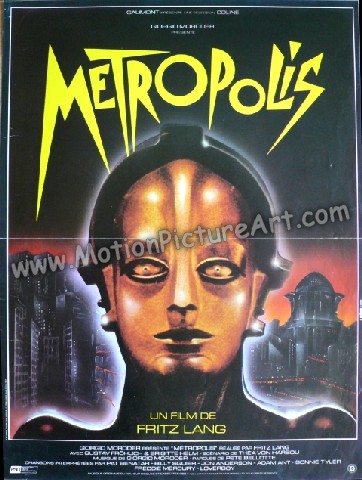
METROPOLIS
Germany, 1926, 117 minutes, Black and white.
Alfred Abel, Gustav Froehlich, Brigitte Helm.
Directed by Fritz Lang.
The first difficulty in giving data about Metropolis is the variation in running times. There were various versions, a two hundred and ten minutes, a premiere cut, a one hundred and fifty-three minutes or a one hundred and forty-seven for Germany (even a restored 2001 version). The American version which was cut ran for one hundred and fourteen minutes with variations up or down from this point. There was a version re-released in the 1970s at eighty minutes with a new musical score by Giorgio Moroder which included songs from contemporary performers like Pat Benatar and Freddie Mercury. This was an interesting experiment – although many purists condemned this kind of musical adjunct to a classic film.
Metropolis was the first film to be registered in the memory of the world-register by UNESCO in 2001. In its time, Metropolis was an extraordinary classic, a vision of the world with the touch of romance as well as a critique of excessive socialism. Metropolis had two levels, literally, in the film. On the surface lived the wealthy and the ruling class, the head who could plan everything but were inexperienced in realities. Below were the workers who toiled away – but lacked vision. They were led by a vigorous woman, Maria (Brigitte Helm). The film shows the leaders in the upper world, especially the businessmen manipulating the workers. Maria falls in love with his son. The plot is complex because the owner creates a robot in the form of Maria who will lead the workers to revolution and to their eventually being crushed. (Brigitte Helm also does a fine acting job as the robot.)
The film has extraordinary special effects and sets, using miniatures. It has become the model for many films showing Metropolis-style cities of the future (including such films as Bladerunner). There is also the famous striking scene where the workers ascend the steps towards the furnaces which then turn into the pagan god Moloch who devours them.
Fritz Lang was one of Germany’s principal film directors in the 1920s with such films as the Doctor Mabusa films and his film about the child killer and molester, M, with Peter Lorre (1931). When Josef Goebbels offered him a role in the Third Reich as its major film director, he fled the country and went to the United States where he had a long and successful career with a wide range of films including Fury, You Only Live Once, westerns like The Return of Frank James and Western Union, thrillers like The Woman in the Window, Scarlet Street and The Secret Beyond the Door as well as thrillers like The Big Heat, Human Desire, While the City Sleeps. He made three films in Germany in the 1960s but these were not successful. He had a reputation of being a very hard taskmaster as a film director.
1.The impact of the film in its time? Establishing patterns for futuristic science fiction films? Political fables? Its being received in Germany? Worldwide? Later re-releases? The 1970s and the contemporary musical score? Its place in the register of world memory?
2.The silent techniques, black and white photography, the cityscapes, the use of models? The vision of the metropolis?
3.The work of Fritz Lang, his reputation in Germany, his skill as a film-maker, his vision, his perceptions of Germany between the wars? His eventually having to leave Nazi Germany?
4.The role of science fiction in film, film fantasy? Symbol and fable?
5.The visual picture of the city, the different levels? The lord of the upper city, the nature of his rule, exploiting the workers?
6.The character of Fredersen, his aristocratic attitudes, a world of pleasure and luxury? His attitude towards the poor children? The contemporary clothes, the allegory of contemporary business in the 1920s? Fredersen and his love for his son?
7.The contrast with the presentation of the workers, seeing them as cogs, working in unison, clockwork? The perceptions by Freder? His vision of Moloch devouring the workers?
8.Maria, her role, leading the workers? Her enthusiasm? The silent style and the seemingly stilted and eccentric performance? Yet its power? Her speeches to the workers, urging them on?
9.Frederson, the catacombs, the taking of Maria, the creating of the robot in Maria’s image? The use of the robot? Brigitte Helm’s performance as both Maria and as the robot? Seeing the robot in action stirring up the workers?
10.Rotwaing, and the creation of the robot?
11.The character of the false Maria, in comparison with the real Maria? Her dealing with the rabble, their not perceiving the difference?
12.Freder, his going down to the workers’ world, the encounter with Maria, in love with her? His warnings?
13.The destruction, the children, the fighting?
14.The melodramatic aspects, the excitement, the burning, the cathedral roof?
15.The reconciliation?
16.The aspects of technology, the science fiction city, the creation of robots in the 1920s, the role of the all-devouring machines?
17.The perceptions of socialism, the new society, the need for workers’ revolutions? The workers, their being exploited? Pessimism/optimism? A symbolic presentation of social issues?